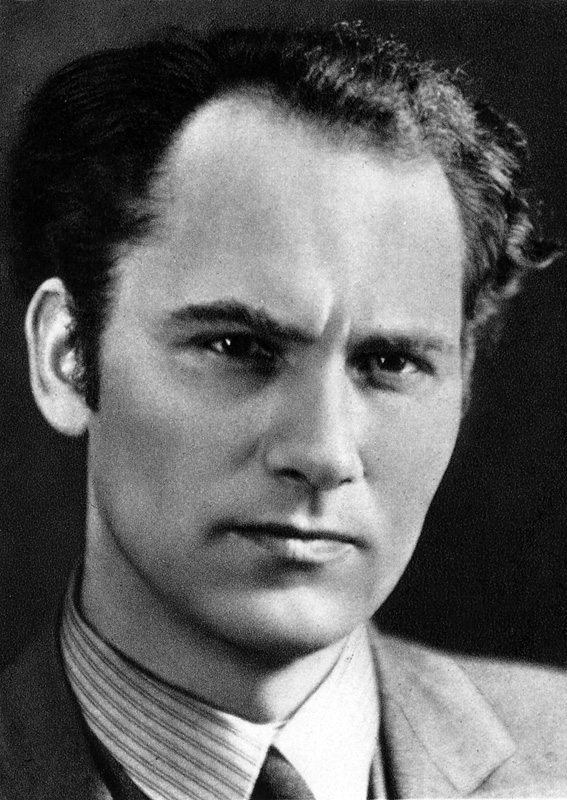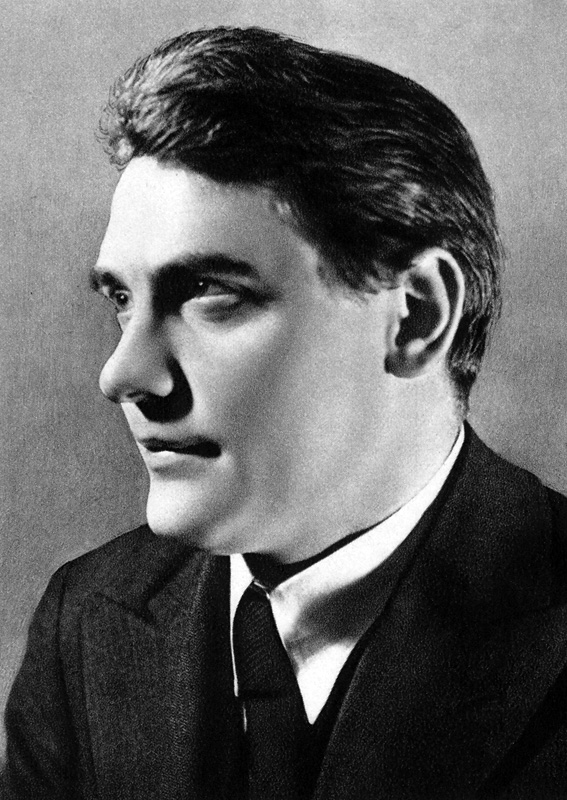|
Dav (journal)
''Dav'' (based on the initials of the first names of Daniel Okáli, Andrej Sirácky and Vladimír Clementis) was a leftist journal published between 1924 and 1937 with intervals in Prague and then in Bratislava by the group Davisti. The journal featured illustrations by Frans Masereel, George Grosz, Marc Chagall and others. It had a Marxist stance. A reprint edition came out in 1965. DAV included important Slovak writers, poets and cultural workers, scientists and philosophers, politicians and lawyers, literary critics and graphic designers and visual artists like Ladislav Novomeský, Ján Poničan, Peter Jilemnický, Andrej Bagar, Jozef Tomášik-Dumín, Jarko Elen, Fraňo Kráľ, Andrej Siracký, Ladislav Szántó, Gustáv Husák, Vladimir Clementis, Eduard Urx, Daniel Okáli, Alexander Matuška, Ľudovít Fulla, Mikuláš Galanda and others. Revue was also a mediator of books by socialist writers (especially poets) like Ján Rob Poničan (''Som, Dva svety''), Jiř ... [...More Info...] [...Related Items...] OR: [Wikipedia] [Google] [Baidu] |
Lawyers
A lawyer is a person who practices law. The role of a lawyer varies greatly across different legal jurisdictions. A lawyer can be classified as an advocate, attorney, barrister, canon lawyer, civil law notary, counsel, counselor, solicitor, legal executive, or public servant — with each role having different functions and privileges. Working as a lawyer generally involves the practical application of abstract legal theories and knowledge to solve specific problems. Some lawyers also work primarily in advancing the interests of the law and legal profession. Terminology Different legal jurisdictions have different requirements in the determination of who is recognized as being a lawyer. As a result, the meaning of the term "lawyer" may vary from place to place. Some jurisdictions have two types of lawyers, barrister and solicitors, while others fuse the two. A barrister (also known as an advocate or counselor in some jurisdictions) is a lawyer who typically specializes in ... [...More Info...] [...Related Items...] OR: [Wikipedia] [Google] [Baidu] |
Vladimir Clementis
Vladimir may refer to: Names * Vladimir (name) for the Bulgarian, Croatian, Czech, Macedonian, Romanian, Russian, Serbian, Slovak and Slovenian spellings of a Slavic name * Uladzimir for the Belarusian version of the name * Volodymyr for the Ukrainian version of the name * Włodzimierz (given name) for the Polish version of the name * Valdemar for the Germanic version of the name * Wladimir for an alternative spelling of the name Places * Vladimir, Russia, a city in Russia * Vladimir Oblast, a federal subject of Russia * Vladimir-Suzdal, a medieval principality * Vladimir, Ulcinj, a village in Ulcinj Municipality, Montenegro * Vladimir, Gorj, a commune in Gorj County, Romania * Vladimir, a village in Goiești Commune, Dolj County, Romania * Vladimir (river), a tributary of the Gilort in Gorj County, Romania * Volodymyr (city), a city in Ukraine Religious leaders * Metropolitan Vladimir (other), multiple * Jovan Vladimir (d. 1016), ruler of Doclea and a saint of the Ser ... [...More Info...] [...Related Items...] OR: [Wikipedia] [Google] [Baidu] |
Gustáv Husák
Gustáv Husák (, , ; 10 January 1913 – 18 November 1991) was a Czechoslovak communist politician of Slovak origin, who served as the long-time First Secretary of the Communist Party of Czechoslovakia from 1969 to 1987 and the president of Czechoslovakia from 1975 to 1989. His rule is known for the period of Normalization after the Prague Spring. Early life Gustáv Husák was born as a son of an unemployed worker in Pozsonyhidegkút, Kingdom of Hungary, Austria-Hungary (now Bratislava- Dúbravka, Slovakia). He joined the Communist Youth Union at the age of sixteen while studying at the grammar school in Bratislava. In 1933, when he started his studies at the Law Faculty of the Comenius University in Bratislava, he joined the Communist Party of Czechoslovakia (KSČ) which was banned from 1938 to 1945. During World War II he was periodically jailed by the Jozef Tiso government for illegal Communist activities, and he was one of the leaders of the 1944 Slovak National Up ... [...More Info...] [...Related Items...] OR: [Wikipedia] [Google] [Baidu] |
Ladislav Szántó
Ladislav is a Czech, Slovak and Croatian variant of the Slavic name Vladislav. The female form of this name is Ladislava. Folk etymology occasionally links ''Ladislav'' with the Slavic goddess Lada. Spellings and variations In Bulgarian and Russian this name is spelled in . ''László'' is a Hungarian variation of this name. Athletes *Ladislav Beneš, Czechoslovak Olympic handball player *Ladislav Benýšek, Czech ice hockey player *Ladislav Čepčianský, Czechoslovak sprint canoer *Ladislav Dluhoš, Czechoslovak ski jumper *Ladislav Fouček *Ladislav Hecht (1909–2004), Czechoslovak/American tennis player * Ladislav Hrubý, cross-country skier *Ladislav Jurkemik, Czechoslovak/Slovak footballer and manager *Ladislav Kačáni, Czechoslovak footballer and coach *Ladislav Kohn, Czech ice hockey player * Ladislav Kuna, Czechoslovak footballer * Ladislav Lubina, Czechoslovak ice hockey player and coach * Ladislav Maier, Czech footballer * Ladislav Nagy, Slovak ice ho ... [...More Info...] [...Related Items...] OR: [Wikipedia] [Google] [Baidu] |
Fraňo Kráľ
Fraňo Kráľ (9 March 1903 – 3 January 1955) was a Slovak poet, novelist and politician who was a leading representative of Socialist realist literature in Czechoslovakia. Biography He was born in Ohio, United States, in the family of Slovak immigrants. At the age of two, he returned to Slovakia with his mother in the city of Smrečany, while the family's financial situation was very poor. After receiving his primary education, Kráľ started to work as a teacher after his graduation from the pedagogical school in Spišská Nová Ves. During his studies, due to his poor diet, he contracted typhus, which left permanent traces in his body, and later lung disease was a direct consequence of it. He enlisted in the military, but soon contracted tuberculosis. He was treated in Tatranské Matliary. He later moved to the Czech sanatorium Prosečnice. Not yet properly treated, he was released from the sanatorium and began working as a teacher in Okoličné, later he was transferred ... [...More Info...] [...Related Items...] OR: [Wikipedia] [Google] [Baidu] |
Jozef Tomášik-Dumín
Jozef or Józef is a Dutch, Breton, Polish and Slovak version of masculine given name Joseph. A selection of people with that name follows. For a comprehensive list see and .. * Józef Beck (1894–1944), Polish foreign minister in the 1930s * Józef Bem (1794–1850), Polish general, Ottoman pasha and a national hero of Poland and Hungary * Józef Bilczewski (1860–1923), Polish Catholic archbishop and saint * Józef Brandt (1841–1915), Polish painter * Jozef M.L.T. Cals (1914–1971), Dutch Prime Minister * Józef Marian Chełmoński (1849–1914), Polish painter * Jozef Chovanec (born 1960), Slovak footballer * Jozef De Kesel (born 1947), Belgian cardinal of the Roman Catholic Church * Jozef De Veuster (1840–1889), Belgian missionary better known as Father Damien * Józef Elsner (1769–1854), Silesian composer, music teacher, and music theoretician * Jozef Gabčík (1912–1942), Slovak soldier in the Czechoslovak army involved in Operation Anthropoid * Jozef A.A. ... [...More Info...] [...Related Items...] OR: [Wikipedia] [Google] [Baidu] |
Andrej Bagar
Andrej Bagar (29 October 1900 – 31 July 1966) was a Slovak film and theatre actor and theatre director. He appeared in 16 films between 1935 and 1965. Nitra's theatre, previously known as , took his name, becoming the Andrej Bagar Theatre in 1979. Selected filmography * '' Jánošík'' (1935) * '' Warning'' (1946) *''The Struggle Will End Tomorrow ''The Struggle Will End Tomorrow'' ( cz, Boj sa skončí zajtra) is a 1951 Czechoslovak drama film directed by Miroslav Cikán. With a screenplay written by Ivan Bukovčan, the film stars Elo Romančík, Gustáv Valach, Vladimír Petruška, Štefa ...'' (1951) References External links * 1900 births 1966 deaths Slovak male film actors People from Trenčianske Teplice 20th-century Slovak male actors {{Slovakia-actor-stub ... [...More Info...] [...Related Items...] OR: [Wikipedia] [Google] [Baidu] |
Peter Jilemnický
Peter Jilemnický (pseudonyms: Al Arm, Peter Malý, Peter Hron) (March 18, 1901 – May 19, 1949) was a Slovak writer, journalist, educator and Communist politician of Czech origin. Biography Jilemincký was born in Kyšperk (today Letohrad), in Eastern Bohemia. His father was a train conductor and he had two siblings. He received his education at a primary school in Kyšperk and Červená Voda, then continued at the Secondary Agricultural School in Chrudim, but graduated from the Teacher Training Institute in Levice in southern Slovakia. After graduating, he worked as a teacher in Slovakia. In 1922 he joined the Communist Party of Czechoslovakia and in 1926 he travelled to the Soviet Union where he worked as a teacher in the Interhelpo. In 1927 he was accepted into the Soviet All-Union Communist Party and studied at the Moscow State Institute of Journalism. In 1928 he returned to the Czechoslovak Republic and until 1929 he worked together with Eduard Urx in Moravská Ostrava ... [...More Info...] [...Related Items...] OR: [Wikipedia] [Google] [Baidu] |
Ján Poničan
Ján Poničan (pseudonym Ján Rob Poničan) (June 15, 1902, Očová – February 25, 1978, Bratislava) was a Slovak poet, novelist, lawyer, playwright and translator. Biography Poničan was born in to a peasant family, his parents died when he was a child and Ján was raised by his relatives. He received his education in a Hungarian classical grammar school in Banská Bystrica and received his diploma in Lučenec. He later continued at the Technical University in Prague, but after two years he transferred to law, which he graduated from in 1927. In 1924 he joined the Communist Party of Czechoslovakia and became a member of the Davisti, a group of left-wing intellectuals and was among the founders of the ''DAV'' magazine. Poničan began to work in Bratislava as a trainee lawyer and gave lectures on the Soviet Union. He was the head of the International Red Aid delegation and visited Moscow and Siberia. After his return to Banská Bystrica he was convicted and imprisoned for il ... [...More Info...] [...Related Items...] OR: [Wikipedia] [Google] [Baidu] |
Laco Novomeský
Laco Novomeský (full name: Ladislav Novomeský) (27 December 1904, Budapest — 4 September 1976, Bratislava) was a Slovak poet, writer, publicist and communist politician. Novomeský was a member of the DAV group; after The Second World War he was commissioner of education and culture of Socialist Czechoslovakia. A prominent Czechoslovak politician, he was persecuted in the 1950s and later rehabilitated in the 1960s. Early life Novomeský was born in to the family of a tailor that immigrated from Senica to Budapest, where he was born. The family moved back to Senica to continue his studies. He later graduated from the teacher training institute in Modra. Novomeský started to work as a teacher while at the same time enrolling as an external student of the Faculty of Arts at the Comenius University where he became involved in literary and political activities. Literary and political career He joined the Communist Party of Czechoslovakia in 1925 and worked for its press. H ... [...More Info...] [...Related Items...] OR: [Wikipedia] [Google] [Baidu] |



